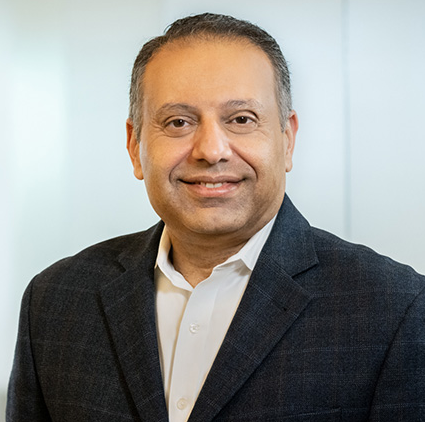- Center on Health Equity & Access
- Clinical
- Health Care Cost
- Health Care Delivery
- Insurance
- Policy
- Technology
- Value-Based Care
FDA Sets Priority Review for Fruquintinib as ASCO Data Confirm Safety Results
The therapy is designed to target multiple receptors and could address an unmet need in metastatic colorectal cancer.
The days ahead of the 2023 American Society of Clinical Oncology Annual Meeting brought good news for patients with metastatic colorectal cancer (mCRC), as Takeda and HUTCHMED announced that FDA had granted priority review for their application for fruquintinib, the oral therapy already in use in China.1
Fruquintinib, a highly selective inhibitor of vascular endothelial growth factor receptors (VEGFR) -1, -2 and -3, works by blocking growth of blood vessels that feed tumor growth; its unique mechanism of action targets multiple receptors, and thus could improve survival in patients regardless of biomarker status.
Awny Farajallah, MD, head of Global Medical Affairs, Oncology, for Takeda, said approval of fruquintinib beyond China would fill a void in patient care.
Farajallah

“We really do not have good solutions for CRC—specifically for metastatic patients who continue to relapse from the disease, there is definitely an unmet need,” Farajallah said in an interview with Evidence-Based Oncology (EBO), noting that 70% of these patients do not have a mutation that can be treated with a targeted therapy.
Fruquintinib, he said, offers a combination of efficacy, safety, and targeting features that could help rising numbers of younger patients who will need treatments in mCRC. “We want to bring this to patients,” Farajallah said.
Besides being an oral drug, fruquintinib is designed to aid patients’ ability to stay on therapy by improving kinase selectivity, which limits off-target toxicities and increases tolerability. Fruquintinib was generally well-tolerated during clinical trials, and results presented during ASCO included phase IV data from China that showed the safety profile among 3000 real-world patients was consistent with clinical trial results.2
Those trials were, FRESCO (NCT02314819), conducted in China,3 and FRESCO-2 (NCT04322539), which involved 691 patients in the United States, Europe, Japan, and Australia, and investigated the use of fruquintinib plus basic supportive care (BSC) vs placebo plus BSC in patients with previously treated mCRC. Results for FRESCO-2, presented in September 2022 at the European Society of Medical Oncology (ESMO) and published June 15, 2023, in The Lancet, showed a 34% improvement in overall survival (OS) among the patients taking fruquintinib (HR 0.66; 95% CI, 0.55–0.80, P < .0001).4
In FRESCO-2, patients treated with fruquintinib achieved a median OS of 7.4 months vs 4.8 months with placebo; also, those treated with fruquintinib achieved a median progression-free survival of 3.7 months vs 1.8 months with placebo. The share of patients with adverse events of grade 3 or higher was 62.7% for the fruquintinib group vs 50.4% for the placebo group.
Cathy Eng, MD, who is the David H. Johnson Professor of Surgical and Medical Oncology and professor of Medicine at Vanderbilt University Medical Center and senior author of FRESCO-2, released a statement to coincide with publication of results in The Lancet.
Eng

“The majority of stage IV patients will have surgically unresectable disease. Hence, we must continue to pursue new treatment options to extend the overall survival of our patients with quality of life,” she said. “These findings from international FRESCO-2 validated the findings of the phase III FRESCO trial which was conducted only in China. Here we have a promising agent with overwhelming single agent activity.
“I look forward to the FDA approval as well as approvals from the European Medicines Agency and the Pharmaceuticals and Medical Devices Agency in Japan, so we can offer fruquintinib to all metastatic colorectal cancer patients.”5
Following the presentation at ESMO, Takeda and HUTCHMED announced the partnership in January 2023 to develop and market fruquintinib outside China.6 Thus, ASCO offered Takeda officials the opportunity to discuss both updated data and recent FDA activity, including a target action date of November 30, 2023, under the Prescription Drug User Fee Act.1 (On June 15, 2023, the European Medicines Agency also accepted the application for fruquintinib.7)
In the interview, Farajallah said there is an increased need for treatments such as fruquintinib, which can treat a broad spectrum of patients with mCRC. More patients are being diagnosed with the disease in their 40s, he said, as seen by the current US Preventive Services Task Force guidelines to screen for colon cancer starting at age 45.8,9
“So that tells you that we’re going to have more patients being diagnosed early, and unfortunately, more patients are going to progress and will require several lines of therapy,” he said.
Data on FRESCO-2 presented in 2022 at ESMO “caught our attention,” Farajallah said, “that this is a medicine that is effective not just in in the fact that it actually prolongs survival,” but also in the tolerability profile and the fact that it targets VEGF 1, 2, and 3.
“It’s very specifically targeting those mechanisms,” he said. “We think it lends itself to have better affordability. And we see that in the clinical trials, as well.”
The next step, Farajallah said, is identifying how fruquintinib can work in other cancers; indeed, an abstract presented at ASCO presented phase 2 data from a small trial (NCT04156958) where fruquintinib showed promise as a second-line or later treatment in biliary tract cancer.10
Other abstracts presented at ASCO included real-world data on the use fruquintinib with and without PD-1 inhibitors,11 and a subgroup analysis of FRESCO-2 based on prior lines of therapy.12
“I'm really eager to bring this medicine to patients,” Farajallah said. “Given the median overall survival that we're seeing, this is what really makes an impact for patients…. When I took care of patients, even 2 and a half months of survival for them was very meaningful. At a personal level, this is what gets you to see your son or your daughter graduate. if you're waiting for that; so it's very meaningful for patients.”
References
- Takeda and HUTCHMED announce New Drug Application (NDA) for fruquintinib for treatment of previously treated metastatic colorectal cancer granted priority review. News release. Takeda Pharmaceuticals. May 25, 2023. June 20, 2023. https://bit.ly/3CIfcug
- Li J, Wang ZQ, Zhong H, et al. A phase IV study to evaluate the safety of fruquintinib in Chinese real-world clinical practice. J Clin Oncol. 2023;41(suppl 16);abstr e15568. doi:10.1200/JCO.2023.41.16_suppl.e15568
- Li J, Qin S, Xu RH, et al. Effect of fruquintinib vs placebo on overall survival in patients with previously treated metastatic colorectal cancer: the FRESCO randomized clinical trial. JAMA. 2018;319(24):2486-2496. doi: 10.1001/jama.2018.7855.
- Dasari A, Lonardi S, Garcia-Carbonero R, et al. Fruquintinib versus placebo in patients with refractory metastatic colorectal cancer (FRESCO-2): an international, multicentre, randomised, double-blind, phase 3 study. Lancet. Published June 15, 2023. doi:10.1016/S0140-6736(23)00772-9
- Wilemon T. New treatment option for metastatic colorectal cancer prolongs survival. VUMC Reporter. Vanderbilt University Medical Center. June 15, 2023. Accessed June 20, 2023. https://news.vumc.org/2023/06/15/new-treatment-option-for-metastatic-colorectal-cancer-prolongs-survival/
- HUTCHMED announces license to Takeda to develop and commercialize fruquintinib outside China. News release. HUTCHMED. January 23, 2023. Accessed June 20, 2023. https://www.hutch-med.com/fruquintinib-outside-china-partnership-with-takeda
- Takeda and HUTCHMED announce marketing authorization application of fruquintinib. News release. Takeda Pharmaceuticals. June 15, 2023. Accessed June 20, 2023. https://bit.ly/3XwJxG9
- Siegel RL, Wagle NS, Cercek A, Smith RA, Jemal A. Colorecal cancer statistics, 2023. CA J Clin. Published online March 1, 2023. doi:10.3322/caac.21772
- Klimkiewicz P. USPSTF colorectal cancer screening update 2021: a review of evidence. Nurse Pract. 2022;47(12):37-42. doi:10.1097/01.NPR.0000884892.06046.34.
- Zhang P, Yang Y, Gou H, Li Q. Phase 2 study of fruquintinib as second or further-line therapy for patients with advanced biliary tract cancer. J Clin Oncol. 2023; 41 (suppl 16); abstr e16161. DOI: 10.1200/JCO.2023.41.16_suppl.e16161
- He L, Cheng X, Tu S. Fruquintinib versus fruquintinib combined with PD-1 inhibitors for metastatic colorectal cancer: Real-world data. J Clin Oncol. 2023;41 (suppl 16); abstr e15592. DOI: 10.1200/JCO.2023.41.16_suppl.e15592
- Dasari A, Lonardi S, Garcia-Carbonero R, et al. Subgroup analyses of safety and efficacy by number and types of prior lines of treatment in FRESCO-2, a global phase III study of fruquintinib in patients with refractory metastatic colorectal cancer. J Clin Oncol. 2023;41 (suppl 16);abstr 3604. DOI:10.1200/JCO.2023.41.16_suppl.3604
The Importance of Examining and Preventing Atrial Fibrillation
August 29th 2023At this year’s American Society for Preventive Cardiology Congress on CVD Prevention, Emelia J. Benjamin, MD, ScM, delivered the Honorary Fellow Award Lecture, “The Imperative to Focus on the Prevention of Atrial Fibrillation,” as the recipient of this year’s Honorary Fellow of the American Society for Preventive Cardiology award.
Listen
Promoting Equity in Public Health: Policy, Investment, and Community Engagement Solutions
June 28th 2022On this episode of Managed Care Cast, we speak with Georges C. Benjamin, MD, executive director of the American Public Health Association, on the core takeaways of his keynote session at AHIP 2022 on public health policy and other solutions to promote equitable health and well-being.
Listen
